Willebrord Snell
Made by Viktoria Domashchenko Q03
Willebrord Snell is a wel-known mathematician and physicist, most known for his law of refraction.
Biography
Willebrord Snell, also known as Willebrordus Snellius or Willebrord Snel van Royen, was born in the late 1500s. Although the exact year of birth is unknown it is most commonly given as 1581. He was the son of Rudolph Snellius who was a mathematics professor at the University of Leiden, in Germany. Although Snell did not go to school, his dad taught him much about science and mathematics while he was growing up. Willebrord Snell was accepted into college where he pursued a law career due to his father's wishes but continued studying and teaching math in place of his father when he was not able to do so himself. As time went by, Snell was given more and more classes to teach until he was a full professor. However, he still found spare time to research the subjects he found interesting. Three of his greatest achievements are explained below; they are the law of refraction, how he computed pi, and how he calculated the earth's radius.
Main Contributions
State, in your own words, the main idea for this topic Electric Field of Capacitor
Law of Refraction
The Law of Refraction, also known as Snell's Law is used for determining the angle that a ray of light will bend away from the normal when it goes from one medium to another.
Computing Pi
How do we visualize or predict using this topic. Consider embedding some vpython code here Teach hands-on with GlowScript
Earth's Radius Calculation
Modern Day Applications
Be sure to show all steps in your solution and include diagrams whenever possible
Simple
Middling
Difficult
Connectedness
Although today we have more accurate ways to measure the radius of the Earth and the digits of pi, it is still awe-inspiring to know that he was able to have such accuracy without all the technology we have today. Most important, though, is his law of refraction. This is used in modern day for many practical applications such as making glasses for people to wear. Because glass bends light is it important to know the index of refraction and the angle that the light will bend so that the person wearing the glasses can see clearly. Refraction is also used very often in the food industry for measuring the amount of sugar inside liquid solutions with a devise known as a refractor. If the angle of light is not what is expected, the companies producing the candy can modify the liquid solution until it is the right consistency.
See also
Are there related topics or categories in this wiki resource for the curious reader to explore? How does this topic fit into that context?
Further reading
Books, Articles or other print media on this topic
External links
References
http://maple.dnr.cornell.edu/produc/refractometer.htm
http://www-history.mcs.st-andrews.ac.uk/Biographies/Snell.html
